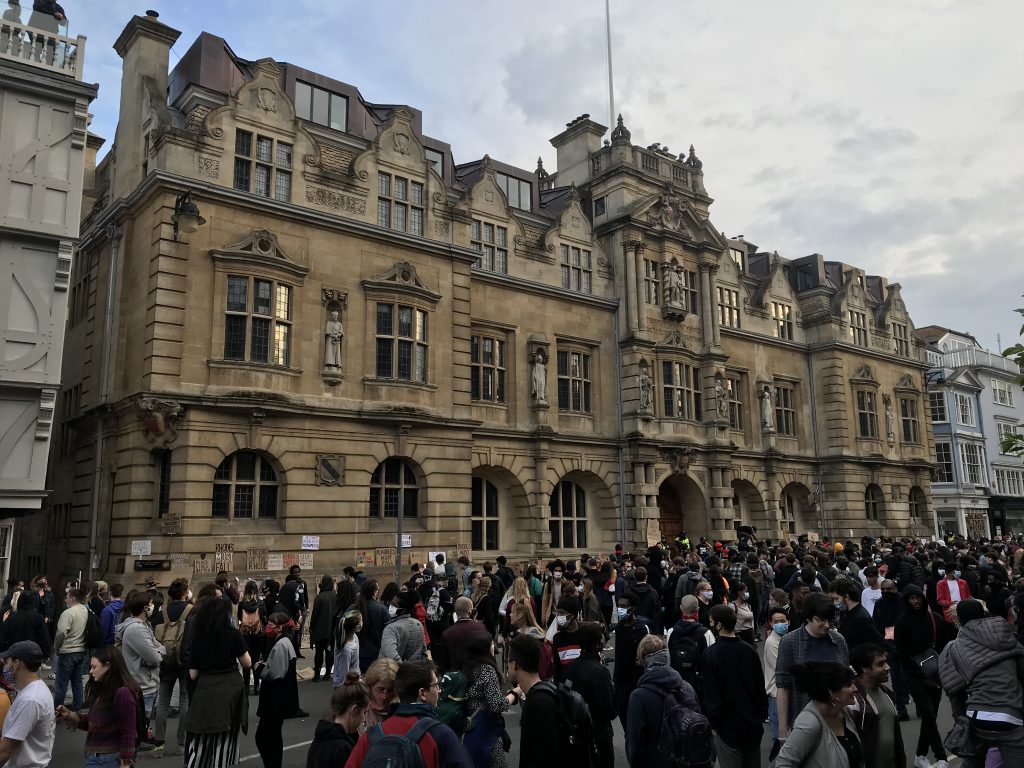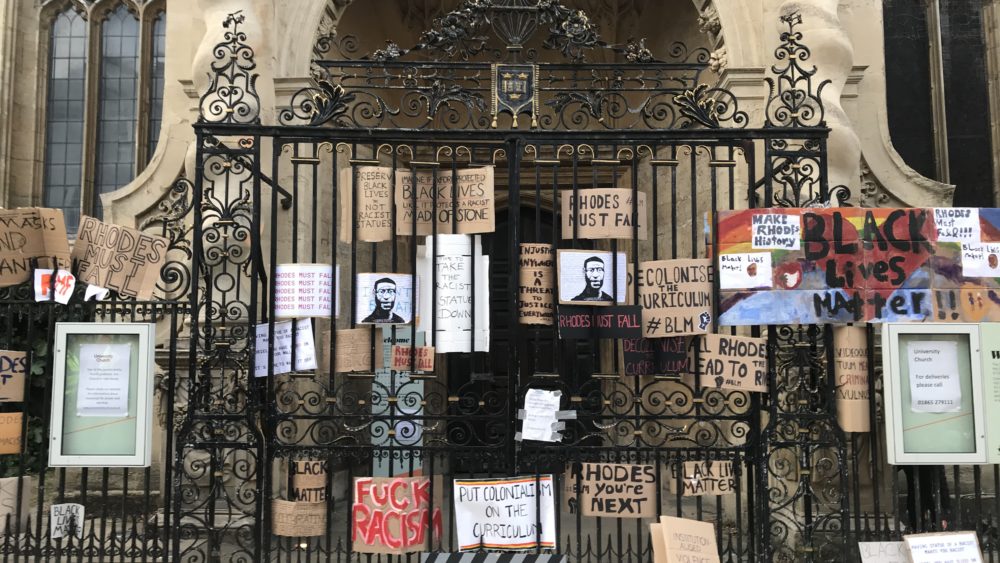“The concern here is not that we are judging history by present standards but that the history in question has always been tasked with justifying looting and slaughter.”
Over the past few months at the University of Oxford, I noticed a stark contrast between the university’s claim to be an inclusive place of learning and its deafening silence on the issues of inequality it actively perpetuated for centuries. The statue of Cecil Rhodes has been at the centre of this conflict for years, both as a symbol of the institution’s inability to truly listen to experiences of its Black students and as physical evidence of its tendency to abandon moral standpoints in the face of losing funding from wealthy donors.
In their defensive statements, the university’s officials express their fears about the erasure of history, a truly unfortunate defence for an institution that consistently defies all attempts to decolonise its curriculum and to provide a balanced debate about the colonial heritage upon which it stands. Now, with monuments dedicated to racists falling around the globe, it seems like Oxford is hitting the ‘end of the Rhode’. If it does, it is more crucial than ever to ensure that the gained momentum is used for a systemic change in how the university tackles racism, rather than the mere removal of heritage that stands as a reminder of its racist history.
Since 2016, the movement Rhodes Must Fall has demanded the removal of the statue of Cecil Rhodes from Oriel College, a constituent college of the University of Oxford. This was met with a shocking display of support for the legacy of this white supremacist and the architect of South African apartheid, helped by the threats of donors to withdraw £100 million in donations if the statue is removed. All while the protesting students were met with the chancellor Lord Patten’s suggestion that they ‘should think about being educated elsewhere’ if they are unable to embrace Rhodes: the man who said ‘I prefer land over niggers’ before he named two African countries after himself.
As someone coming from the post-socialist bloc, where falling monuments to communist oppressors were a defining moment for the renewal of democracy, I struggle to not feel anger at seeing Oxford’s denial to provide the same kind of justice to the black community.
Justice that is the acknowledgement of the history of colonial exploitation, murder and rape both in removing the glorified effigies of men who caused unimaginable hurt and in making sure that their legacy does not perpetuate further inequality. Looking at recent history makes it painfully obvious that we white people understand the importance of removing glorified depictions of evil men but only as long as we are the ones hurting.
This was the case in 1989 and also in 2012 when plaques dedicated to Jimmy Saville, a late British philanthropist found to be a child rapist, were removed. The extreme contention and resistance to removing statues of men like Cecil Rhodes in Oxford or Edward Colston in Bristol are not about seeing statues as part of history and education, as many argue. It is about resisting the truth that the men who created the Western world for us caused more suffering to black people and people of colour than the men we ourselves deem to be monsters caused to us. Falling statues are only controversial when the falling undermines our place in the world; when it undermines our ‘triumphant white history’ and the self-image we derive from it.
Enshrined high above the entrance to the college, Rhodes’ glorified effigy stands as a reminder of his generosity to some. To others, it is a reminder that the fortune he left to the college, accumulated from blood diamonds, means more than setting the record straight and correcting the history that erased the cost at which the University has thrived.
With both Oriel College and the University failing to acknowledge and address this, both the statue and the legacy of Cecil Rhodes are alive and well — raising important questions about what being and belonging in Oxford mean for white and black students. It cannot mean the same thing when one admires the glamour of the University’s splendid buildings, while the other, looking at the same buildings, sees monuments dedicated to men who valued land over the lives of people with the same skin colour as them. To not decolonise our institutions is to deny the truth to the ones that are hurting, as well as to ourselves.

Photo of the “Rhodes Must Fall” protest at Oxford, England, by Em Hartova.
The ‘erasure of history’ seems to be the main concern of many.
Unfortunately, colonial history cannot be erased even if glorified effigies of racists in any way did provide a nuanced or useful account of it. On the contrary, such monuments in and of themselves obscure other histories, raising important questions about whose histories are being upheld and at what expense. The concern here is not that we are judging history by present standards but that the history in question has always been tasked with justifying looting and slaughter. While we cannot rewrite this past, we can be accomplices in a historic movement that aims to end celebrating the oppression that the British Empire and its leaders conceived.
As I was writing the final lines of this article, Oriel College announced the creation of an independent commission for enquiry into the key issues around the statue of Rhodes. While we might be hitting the ‘end of the Rhode’, we are only at the beginning of a much longer journey of decolonisation. We can either work on removing the barriers that give places different meanings depending on the colour of our skin, or we can continue to talk about the questionable greatness of heritage that has contributed in large part to today’s global inequality.
This article focused on Oxford and Cecil Rhodes but the pattern we are seeing here can be found all around us in the West. Changing our white-dominated institutions will not happen without white voices expressing solidarity with movements fighting for social justice and actively participating in dismantling systems of oppression. This is our problem to fix. As movements such as the Progressive International point out, solidarity must be more than a slogan; bearing witness to civil rights movements in a silent approval will not do. To echo Progressive International’s message: we must translate our solidarity into concrete action and see our institutions and history decolonised book by book, dollar by dollar, statue by statue.
A footnote.
I am a white man educated at elite British institutions who benefited greatly from the privilege of never having to think about his skin colour. I am anything but a spokesperson for PoC and Black communities. I was lucky to have my privilege challenged by amazing people along the way and for that, I am beyond grateful. My knowledge of the issues of race is partial and I will never be able to understand the lived experience of racial oppression and injustice. No white person can. What we can do, and what I attempted in writing this article, is to stand up and use our privilege to be allies and accomplices in a movement striving for justice. To whoever made it this far, I urge you to check out platforms like ‘Rhodes Must Fall Oxford’, ‘Black Lives Matter Oxford’, ‘Uncomfortable Oxford’ and ‘Progressive International’. These bring together grassroots voices and inspire and educate tirelessly. For that, I will never cease to be thankful.
Photography by Em Hartova.
Do you want to be informed of DiEM25's actions? Sign up here




